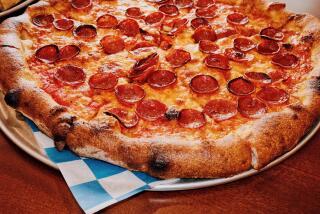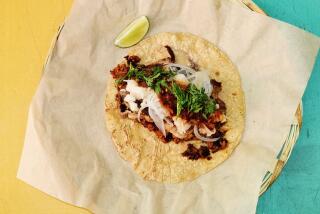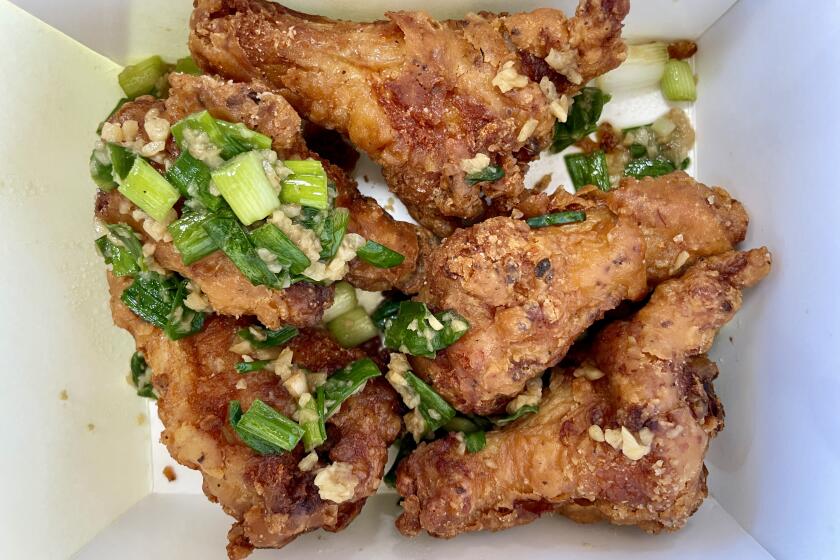Review: Masterful tortillas make this Boyle Heights taco stand an L.A. essential
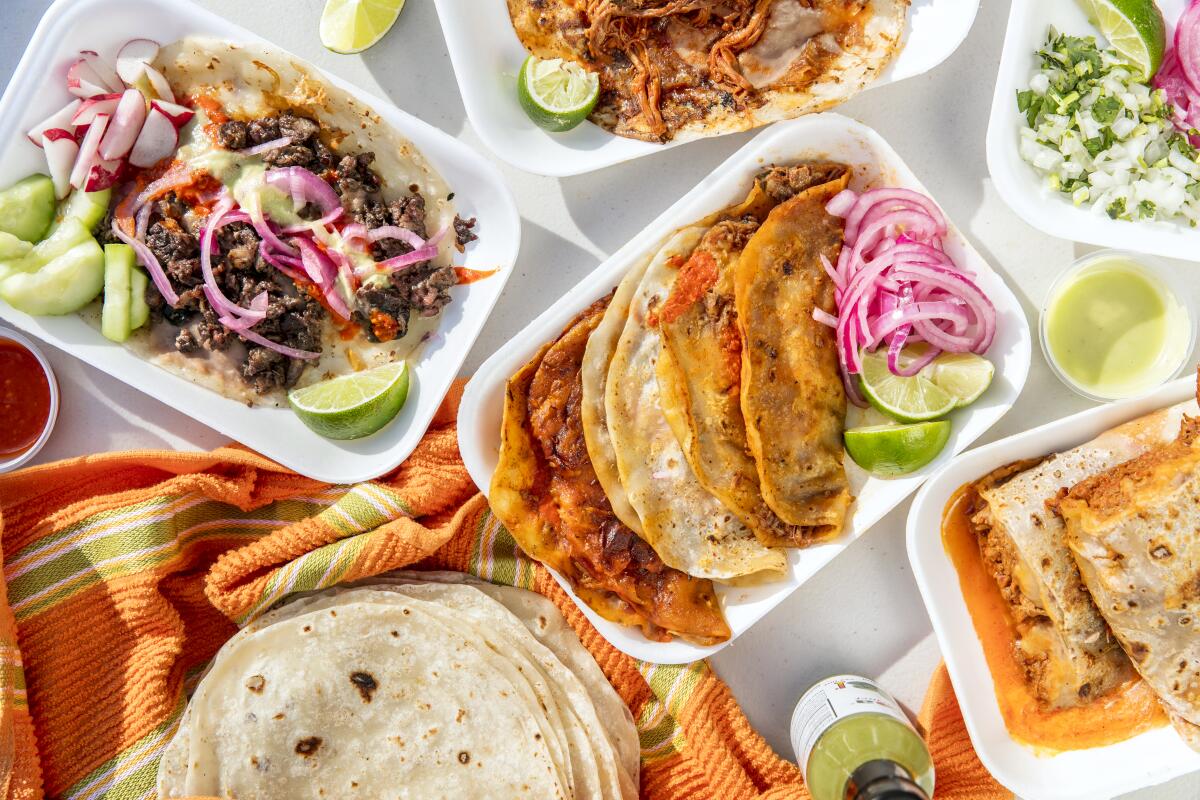
Walter Soto stood under a makeshift tent in an industrial corner of Boyle Heights, making tacos in rapid batches of four. He pitched handfuls of shredded Monterey Jack cheese onto the griddle in neat piles; the strands hissed and buckled in the heat before fusing into lacy circles. He laid speckled, just-made flour tortillas atop the cheese, flipped them over, applied slicks of refritos and then crowned them with meat: chopped carne asada, ropy-soft birria de res, or chile colorado that glowed a radioactive red-orange.
A few feet away, Julia Silva cranked out stacks of flour tortillas. Pluck, pat, fling; pluck, pat, fling: She tore off globs of dough, shaped them with her palms and cooked them on a domed electric comal. Her eyes weren’t focused on her craft; it was as if she had vision in her hands. Her mastery yielded nearly translucent, elastic discs.
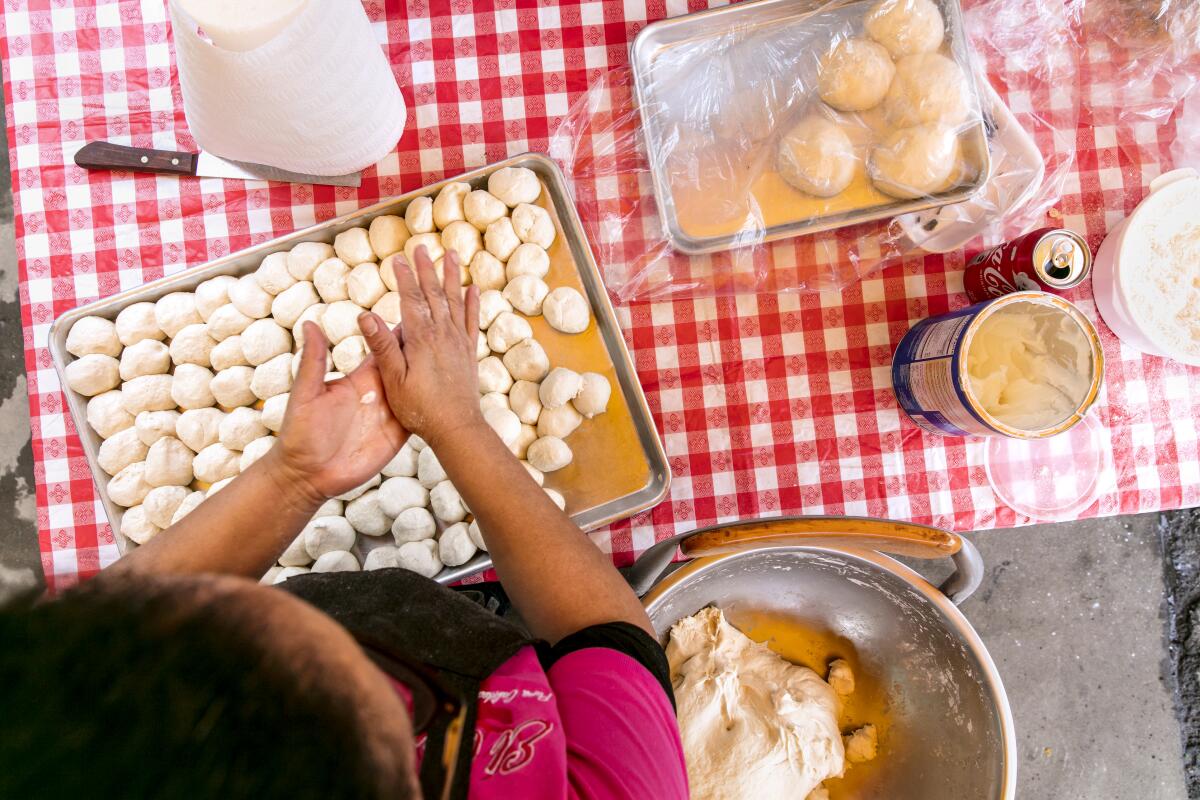
The magnificence of the tacos has made El Ruso a crucial stop on the Los Angeles taco circuit. Many seekers found it through an Eater L.A. article in July and the steady posts on food-centric Instagram accounts that followed. Soto and Silva are new to the limelight but not to their trade: They’ve popped up around L.A. for the last three years, and they’ve been perfecting their techniques together for 20. Combining culinary traditions from Sonora and Baja California, El Ruso looks to be made for the moment in tacos.
Soto is a native of Tijuana. He was 17 when he landed his first job as a taquero in Culiacán, Sinaloa; he bounced around Nuevo Laredo and Guadalajara before landing in Ímuris, Sonora, a town 65 miles south of the Arizona border. It was there Soto met Silva, when she walked in as a customer to the taqueria where he was working. She’s been making flour tortillas since she was 4; her mother is a tortilla artist, she said, and passed down her talents. Soto and Silva were a couple for a while — they have a daughter — but their professional partnership outlasted their romantic connection.
They called the place El Ruso after a nickname that Soto picked up during a stint in the Mexican military. (It’s a story. Ask him about it.)
El Ruso is open mid-morning to mid-afternoon six days a week (no Sundays) on a side street off Olympic Boulevard in Boyle Heights. Look for the red banner and walk past the chain-link fence; you’ll see the trailer and a few covered tables. Crowds fluctuate in size: Sometimes mobs descend during a Thursday lunch; sometimes the scene is unpredictably quiet on a late Saturday morning.
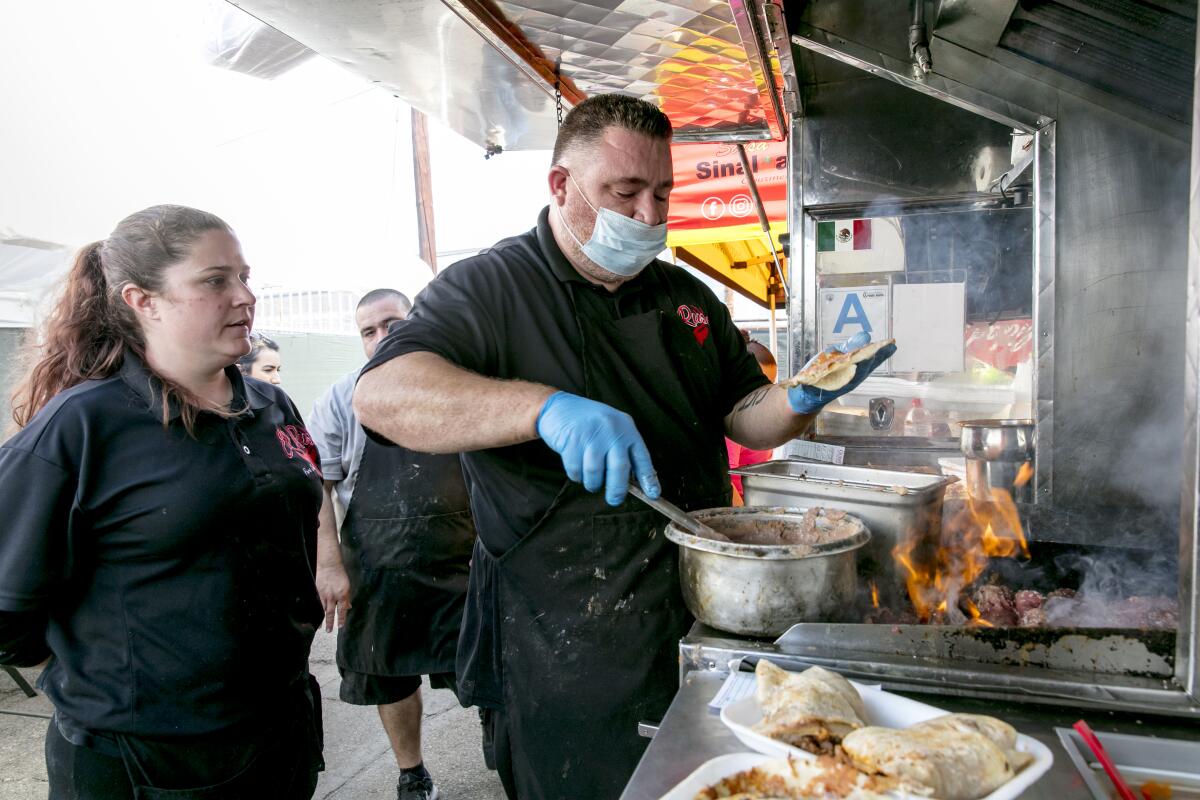
Start with a carne asada taco. Beans and cheese are optional, but you want them: Soto shows restraint with both. They magnify the savor of chuck-eye steak, grilled to a shade past rosy over mesquite and hacked to a rough mince (often by Soto’s brother, Ervin). Squeeze lime juice over generously; the acidity offsets the booming, smoky richness. On weekdays other taco fillers include chorizo and often grilled chicken — they’re satisfying, but the asada is the slayer.
Saturday, when the glorious stewed meats appear, is really the day to show up at El Ruso right now. The Tijuana-style birria de res follows a recipe from Soto’s mother, the beef simmered in Tecate lager scented with clove and bay leaf. Soto dips tortillas in the birria consommé, dying them traffic-cone orange, before griddling them. The spice in the Sonoran-style chile colorado (Silva’s mother’s version) comes across more earthen than incendiary. Its rich, satiny texture is deep-sigh soothing.
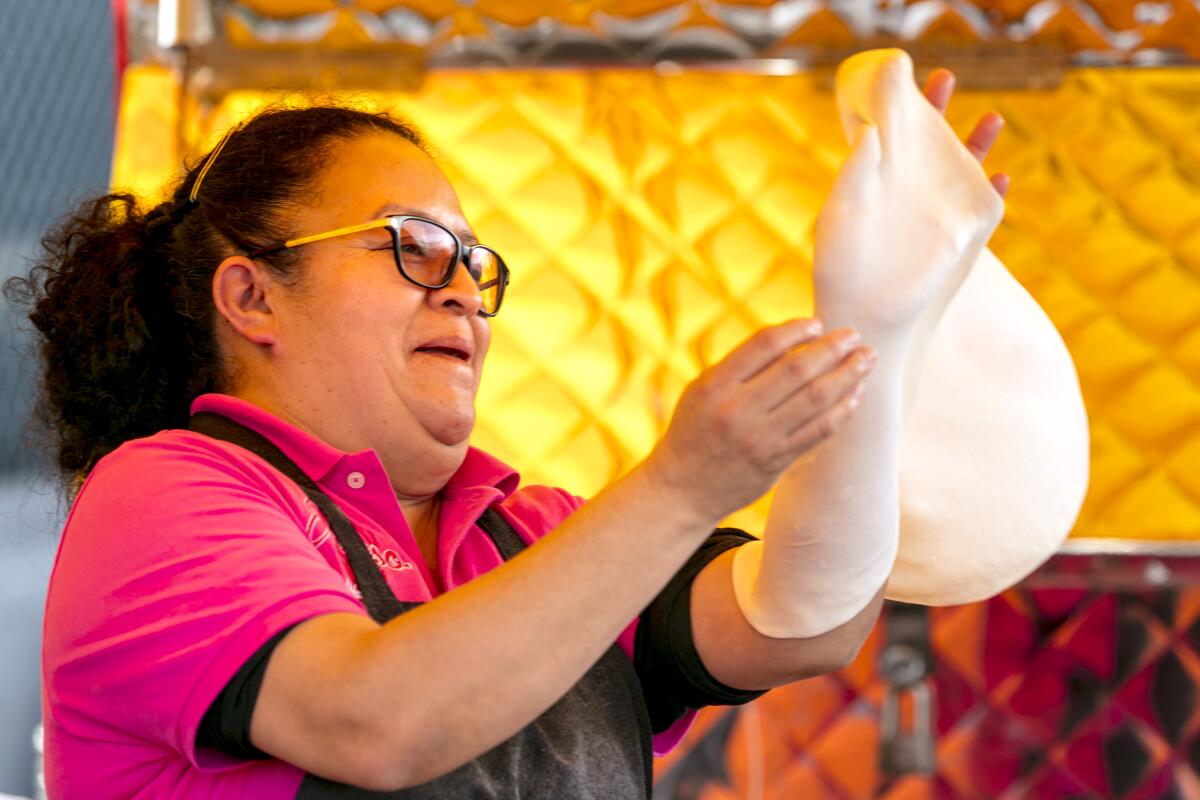
Silva is always around on Saturdays, focused on her tortillas and wryly ignoring the customers making videos of her work. If she isn’t making tortillas to order, she has fashioned a day’s supply that morning. (Silva uses Crisco as the fat for the tortillas. In Sonora she grew up using lard, and though these are flat-out among the city’s finest flour tortillas, I’d love to taste her original version one of these days.)
If she doesn’t seem too inundated, ask nicely for a sobaquera — a supple, thin tortilla the size of an 18-wheeler’s hubcap filled and rolled like a burrito. It’s a specialty of Sonora rarely seen in Los Angeles. (El Ruso uses the slang term “sobaquera,” which is a derivation of “sobaco,” the Spanish word for “armpit.” One possible origin story of the name is that the tortilla maker stretches it shoulder to shoulder in its shaping. The term can also be considered a pejorative. Asking for a “tortilla de agua” or “tortilla grande” works too.)
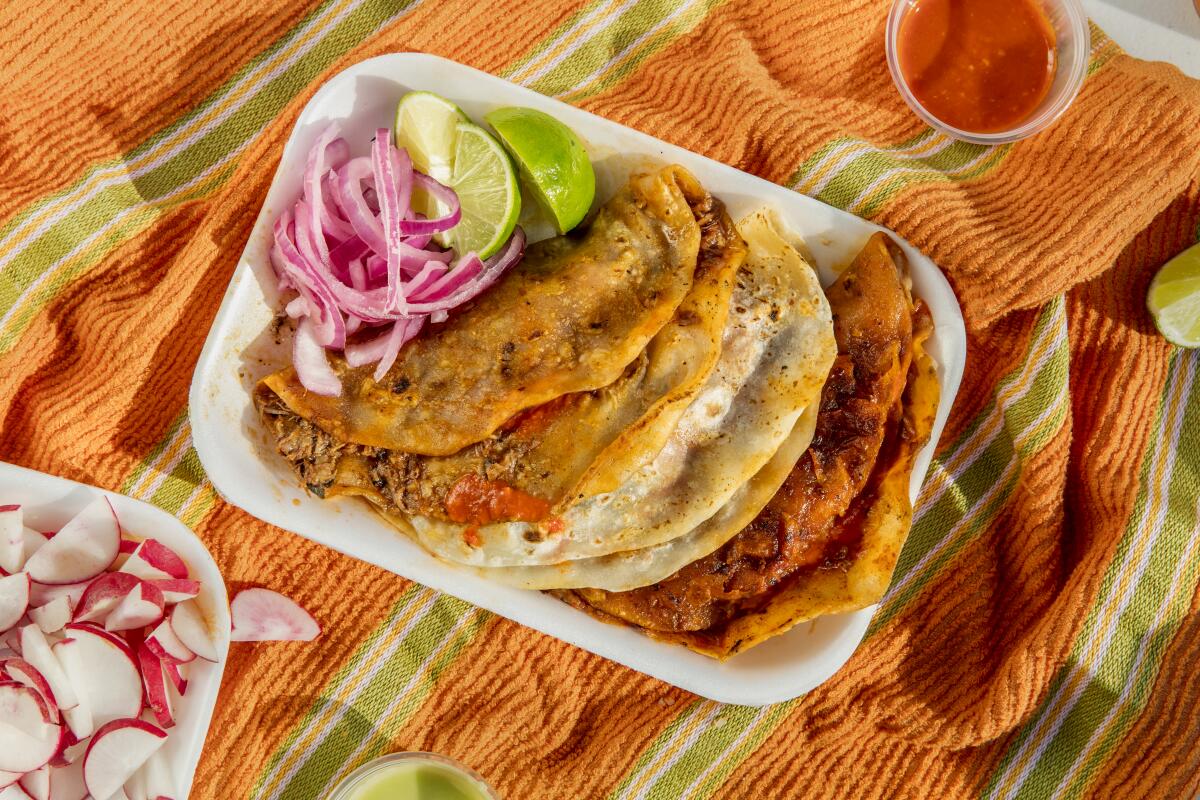
Silva calmly tosses the dough across her forearms before laying it over the comal. She hands it to Soto with both hands, like a blanket. He urges customers to try it with chile colorado. This is their shared masterpiece, and it is something every tortilla-loving Angeleno should experience.
Soon its greatness will be more readily available. This winter, Silva and Soto are replacing their compact trailer with a customized 20-foot truck. They’ll be parked in the same location, but they’ll have a greater capacity to cook, and specials like sobaqueras and the stewed meats will become menu staples. Silva’s mom is arriving soon to help make the on-the-spot tortillas.
A bigger rig will likely attract a larger audience. Beat the rush; go now. There’s something special about the contained magic of their current setup. No frills, no pageantry: just two aces long united in their creation of something singular.
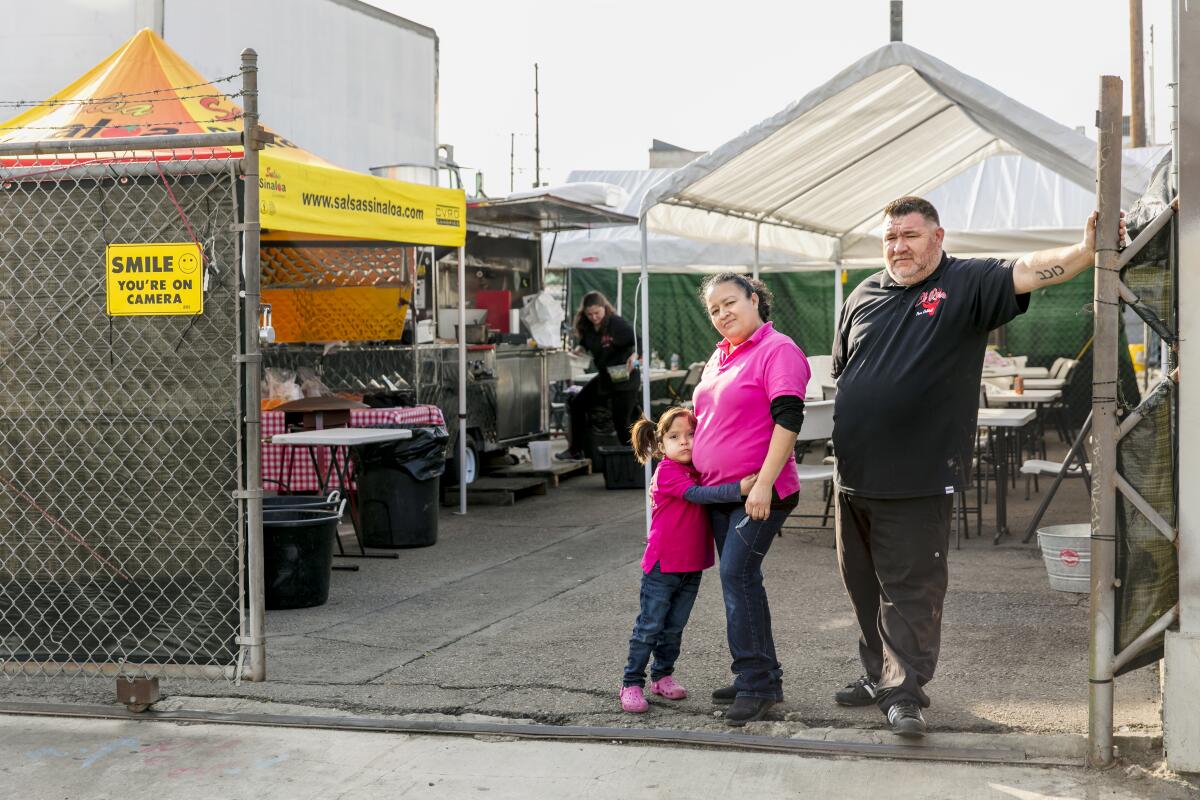
El Ruso
Location: 1401 Mirasol St., Los Angeles, (323) 246-6819, elrusola.weebly.com
Prices: Tacos with meat, cheese and beans $3.25. Tacos with meat and beans $3. Sobaquera with meats, beans and cheese $8.
Details: Cash only. No alcohol. Street parking. Wheelchair accessible.
Recommended dishes: Tacos (or an extra-large tortilla called a “sobaquera”) filled with carne asada, birria de res or chile colorado.
More to Read
Eat your way across L.A.
Get our weekly Tasting Notes newsletter for reviews, news and more.
You may occasionally receive promotional content from the Los Angeles Times.
